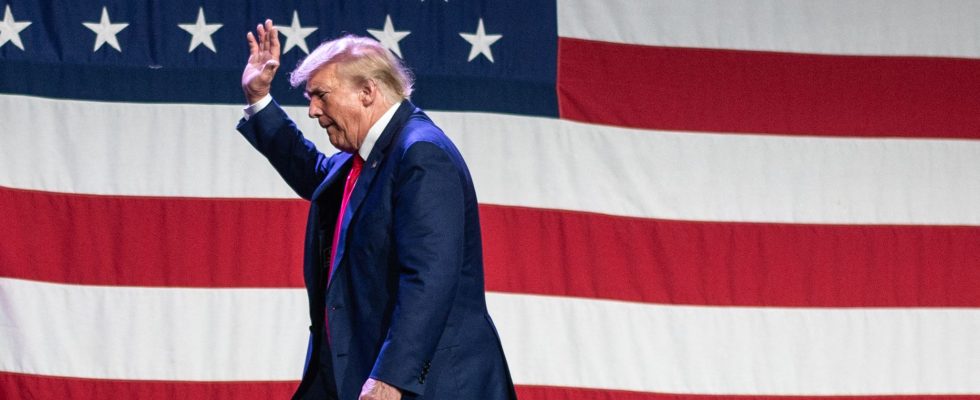Donald Trump broke his own record. Already indicted twice by American justice, a first in the history of the United States, the former president will face a third trial for having tried to prevent the certification of the victory of his opponent, Joe Biden, at the 2020 presidential election. Special Prosecutor Jack Smith shared, Tuesday, August 1, the four counts against Donald Trump: conspiracy against the United States, conspiracy to deprive voters of their right to vote, conspiracy to obstruct due process and attempted obstruction of that process.
For Lauric Henneton, lecturer in American civilization, this unprecedented indictment announces a presidential year where anything can happen and a very close election.
L’Express: Donald Trump is already under two charges. Why is this one different?
Lauric Henneton : This third indictment is much more serious. We do not necessarily realize it because the first two were the subject of immense media coverage, with a very strong police presence in case there were excesses. One would therefore think that it is simply another indictment of Donald Trump. But comparatively, the Stormy Daniels affair – the make-up of campaign accounts – or even that of the confidential documents not returned are not of the same magnitude. This is American democracy! A fourth, quite similar indictment should also take place in a fortnight for his attempt to falsify the 2020 presidential election in Georgia.
The special prosecutor has said he wants a speedy trial, which could take place in the middle of the presidential campaign next year. Is a conviction likely? From a legal point of view, would it prevent Donald Trump from being a candidate?
Nothing can prevent his candidacy. Even at the bottom of a cell, Donald Trump could be a candidate and elected president. In law, the only constraint is that he could not vote. But either way, the outcome of the trial is uncertain. Trump could very well be acquitted on procedural grounds, which would be a real thunderbolt. He would turn that into proof of innocence and say it was a political trial. If convicted, he will appeal and the case could not be retried before the election. He would then remain in a sort of in-between: a guilty verdict, but not yet confirmed by the court of appeal. Regarding the calendar, two trials are already to be held next year. The one on the 2020 election may therefore have to wait until after the 2024 vote.
According to a recent survey, Donald Trump remains the big favorite in the Republican primary, with 54% of the vote, well ahead of his rivals. Why do Republican voters still support him so much?
There are three types of Republican voter. 37% are “trumpolâtes”, who think that Trump is innocent and will vote for him no matter what. 25% are “trumpophobes”, who already know that they will not vote for him and who need a change. The others are “trumpocompatible”: they could vote for Trump, but are still undecided. Everything will depend on them. Their tolerance threshold vis-à-vis the former president is close to saturation. If he were found guilty of “conspiracy against the American state”, this could be the straw that broke the camel’s back. Of course, that could change by November 2024. We must not underestimate Trump’s capacity for resilience and persuasion: we’ve already said he’s cooked in the past, but he’s still there!
Three weeks before the first televised debate, how did the other Republican primary candidates react to this indictment?
It’s still not very clear. Basically, their position will not be dictated by Donald Trump himself, but by his pool of votes. His 72 million voters, many of whom are very loyal to him, and whom the other candidates will need to win. So they’re stuck having to distance themselves from Trump without pushing him down. Some have chosen a hard line, like Chris Christie, the former governor of New Jersey, who opposes him. The others are on a tightrope: they say that if elected, they will take up Trump’s legacy but go further. The exercise of the televised debate will depend on the questions asked. If candidates are asked if they support a man convicted of election rigging, there will be great moments of loneliness and very convoluted answers…
If Trump is the Republican candidate, isn’t a conviction likely to tighten Republican voters around him and benefit him?
It’s possible, but hard to predict. In some states, the election will be very tight and is played now. This is more and more often the case: 100,000 or even 10,000 votes difference, as in Michigan in 2016 or Georgia in 2020. This shortfall means that Trump could lose a state where he was given in head because a few thousand voters can no longer take it and preferred Joe Biden, another candidate, or abstained. On the other side, Democrats fear a lack of enthusiasm for Biden and people not going to vote, which could allow Trump to win by a narrow margin. The challenge is to be the one who manages to best mobilize his voters.
